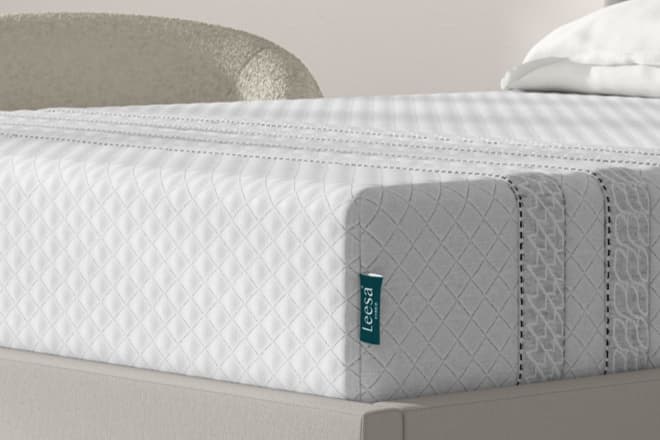When you can't turn your brain off to relax at the end of the day, it can be hard to fall asleep. We've all been there, and it's no fun (especially the next morning). It can be hard to start your day when you wake up after a night of bad sleep or don't get enough sleep. Luckily, there are many sleep remedies, from herbal tea to nighttime yoga and meditation.
If you've exhausted those options (pun intended), have you ever considered trying melatonin? Humans all produce melatonin — it's a natural hormone, one that's conducive to sleep. But sometimes, it's still not enough, or your circadian rhythms get thrown off. So, we're bringing you our considering melatonin sleep guide.
What is Melatonin?
Melatonin is a hormone that controls your body's sleep-wake cycles, also known as your circadian rhythm. So basically, it tells you when you're tired at night and when it's time to wake up in the morning. The more melatonin in your body, the sleepier you feel.
Where does melatonin come from? Your brain! In your brain, the pineal gland (which is right above the center of your brain) produces melatonin. This gland is shaped like a pinecone and only about the size of a pea, but it has a big job—it's responsible for your sleep cycles.
Besides direct control by your pineal gland, your melatonin levels increase and decrease based on external factors like sunlight exposure and foods like walnuts, tomatoes, olives, rice, strawberries, cherries, and cow's milk (all of these foods contain varying levels of melatonin).
How Does Melatonin Work?
How does your body know when to produce melatonin and how does it know how much to make? The amount of light you're exposed to during the day and your body's internal clockwork together control how much melatonin your body produces. In the evening after the sun sets, the lack of light signals your body to start releasing melatonin, getting you ready for sleep. While you sleep, your melatonin levels stay pretty high and keep you asleep until the sun comes up. Then, as it gets brighter, your melatonin levels drop and you wake up.
This is why, during winter months when the days are shorter (and there's less sunlight), you may feel sleepier and need more sleep. Since there's less daylight, your body may produce more melatonin or release melatonin earlier in the day than it does in the summer months. However, your pineal gland can be easily tricked.
Ever wonder why you get sleepy when you're in a dimly lit room or dark environment for a length of time, even if the sun is shining outside? Have you ever thought about why you can sleep late into the afternoon if your room stays dark? (Thank you blackout curtains!) Even if it's not nighttime, your pineal gland gets confused and will release melatonin if you're in the dark for long. That's also why it's hard to sleep with a light on. The artificial light in your office or bedroom is often bright enough to prevent your body from releasing melatonin.

Melatonin and Sleep
So, we've established that the hormone melatonin has a sleep-inducing effect and can help you feel calmer. As we mentioned before, the more melatonin your body produces, the sleepier and more relaxed you feel.
Did you know that not only is melatonin naturally produced in your body, it's also available as a supplement—in pills, liquids, chewable, and even patches. That's right! If you have trouble winding down and falling asleep at night, you can take melatonin.
If you're going to add a melatonin supplement to your sleep routine, experts recommend taking it 30 to 60 minutes before you go to bed. This gives the supplement time to do its job so that you're sleepy and relaxed at bedtime.
It's important to know that melatonin supplements are not regulated by the Food and Drug Administration (FDA) because it's not classified as a drug, so be really careful when figuring out your correct dosage. The dosage that works for your partner may not work for you, and vice versa, so talk to a professional to get the right dosage of melatonin to help you get better rest.
Is Melatonin Safe to Take?
As we mentioned, if you're going to take a melatonin supplement, you want to make sure you're doing it safely—talk to your doctor and find the right method and dosage for you. Remember that melatonin is not regulated by the FDA, so the “recommended dosage” varies between products. Because of this, it's also important to make sure you are buying from a reputable source. (Again, this is where consulting your doctor can be helpful.)
The safest dosage of melatonin is the lowest amount you can take that's still effective in helping you fall asleep. We know, we know, that's not super helpful, but the right dosage for you depends on a few things—namely, your weight, age, and melatonin sensitivity. That's why it's recommended to talk to a professional. A small dose (somewhere between 0.2 and 5 milligrams) is usually a good place to start. You want to benefit from its sleepy effects, but you don't want to take too much.
If you take too much melatonin, it can negatively impact your circadian rhythm (a.k.a. mess up your sleep schedule) and cause other side effects, like nausea, dizziness, headaches, anxiety, diarrhea, and joint pain. A melatonin overdose can also affect your blood pressure, so if you're on blood pressure medication, talk to your doctor before taking melatonin. Some other medications and substances increase your melatonin levels, too, so if you want to add melatonin to your nighttime routine, yep, you guessed it—make sure you consult with a professional. Additionally, since melatonin makes you sleepy, you shouldn't take it with caffeine (which makes you feel alert) or alcohol either.
When Should you Consider Taking Melatonin?
You may consider adding melatonin to your nighttime routine if you usually have trouble winding down or can't relax after a long day. If stress, anxiety or that can't-turn-your-brain-off feeling is causing you to have trouble falling asleep, it's recommended to take melatonin 30-60 minutes before bed.
If you're a night owl or suffer from late-onset sleep disorder, (where your sleep is delayed 2 or more hours past most people's bedtimes), you should take melatonin 2-3 hours before bed. And remember, the smallest effective dosage of melatonin is the safest dosage, so start small and add more as needed.
Melatonin can help you get the sleep you need to feel rested and recharged when you wake up. After all, sleep is important, just like food and water. When you sleep, your body physically recharges—it goes through chemical processes that help you feel rested when you wake up. So, it's no surprise that lack of sleep can have serious side effects, including lack of focus, anxiety, high blood pressure, mood swings, and weight gain. If you want to try adjusting your sleep schedule to get better rest but don't think melatonin is for you, here are a few other things you can try in your bedtime routine:
Create a nighttime routine and stick to it (the best that you can). Eat dinner, clean up the kitchen, take a bath, read a book, go to bed, and repeat the next night. Try going to bed and waking up at the same time every day to train your body and create a habit that helps you get better rest.
Try meditation or yoga for at least 10 minutes close to bedtime.
Eat foods that are high in tryptophan (like turkey or cottage cheese) and drink sleep-inducing tea (or other sleepy drinks) as part of your nighttime routine.
Make sure your sleeping environment is as dark as possible. Remember, light tells your pineal gland to stop producing melatonin and that's not what you want when it's time for sleep.
Try sleeping with white noise. This creates a veil of noise as you sleep, so outside sounds (like the early morning garbage truck or your roommate making breakfast) don't wake you up before your alarm does.
If you think you suffer from insomnia, shift work sleep disorder, or another chronic sleep problem, talk to a doctor first. They'll be able to assess your symptoms and prescribe the most effective treatment for you.
Of course, if you're having trouble sleeping, it may be a simple fix: a new mattress. At Leesa, better rest is kind of our thing. That's why we have two (awesome) mattresses, as well as sleep accessories like pillows, sheets, and bed bases to help you create a relaxing, cozy bedroom sanctuary to fall asleep faster and get better, deeper rest.

How Much Melatonin Should I take?
The recommended dose of melatonin varies depending on your age and how you respond to the dose. Ordinarily, the typical melatonin dosage for adults is between 1 and 5 milligrams. It's suggested that you start with the lowest possible dose to see how the supplement affects you.
Melatonin Dosage Chart by Age
Preschool Age (3-5) | Elementary School Age (6-12) | Adolescents and Adults (13+) | Seniors (over 65) |
2-3 mg. | Up to 5 mg. | 1-3 mg. |
Should I Take More Melatonin Based on my Body Weight?
Melatonin should not be measured based on weight. This is because melatonin is a hormone, not a vitamin. The most defining factor to determine how it will affect you is your age since your body is more sensitive to it at different times of your life. The weight of the person hasn’t proven to change that.
Get Your Best Night of Sleep Every Night With Leesa
Whether or not you try melatonin to help you improve your sleep hygiene, it's a fact that having an uncomfortable mattress (or one over eight years old) makes falling asleep harder. We suggest you shop Leesa's collection of memory foam and hybrid mattresses. You can make your selection online, but you can also try them out in person at West Elm or Pottery Barn.
No matter which Leesa mattress you choose, you'll find it unbelievably supportive and comfy. Our assortment of bedding and pillows are also designed to help you drift away on a cloud. Add Leesa products to your sleep journey and experience the difference.
FAQs
Does taking more melatonin make you sleepier?
With melatonin, less is more, just like with any sleep aid. A higher dose of melatonin may give you a headache or make you sleepy, dizzy, or nauseated. That's why it's recommended not to drive or use machinery for 4-5 hours after taking melatonin. If you're considering melatonin for sleep, start with the lowest possible dose and work up to the recommended amount.
Does melatonin make it hard to wake up?
Not usually. Experts in sleep medicine have found that the occasional use of melatonin before bed improves sleep quality and helps people wake feeling more rested and refreshed.
Is taking melatonin every night bad?
Most sleep experts do not recommend melatonin every night, although it can be taken nightly for one or two months. You want to encourage your body's natural melatonin production by going outside into the sunlight and putting away your phone, laptop, or tablet for a few hours before falling asleep.
How fast does melatonin work for sleep?
Melatonin is a dietary supplement that mimics the melatonin your body already produces in the pineal gland. Because of that, it's recommended that you take melatonin up to an hour before bedtime. See your doctor if you keep experiencing sleep problems, especially over the long term.
How long does melatonin keep you asleep?
Melatonin controls the body's circadian rhythms. Your body's internal 24-hour clock tells you when it's time for bed or time to get up in the morning. By supplementing your body's level of melatonin, you'll start to feel drowsier or more sleepy than usual, making it easier to drift off and stay asleep for 7 to 8 hours. If you're having difficulty sleeping, speak to your doctor, and follow our tips in this Leesa's Considering Melatonin Sleep Guide.



